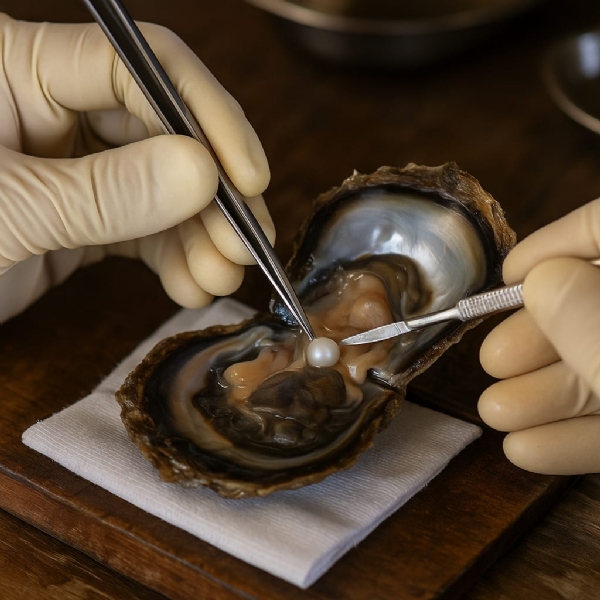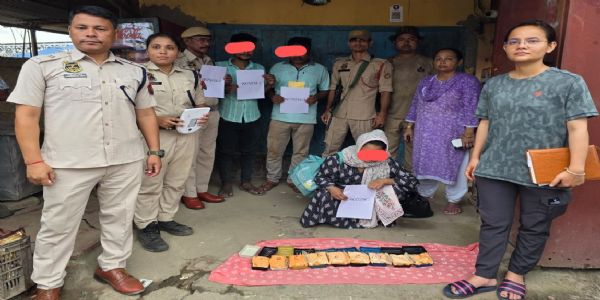
Lucknow, 03 Aug
(HS): “Even the best
technology developed by humans cannot match the normal processes of nature” -
this is no longer just a thought, but a scientifically proven fact. This
revolutionary truth has been established by world-renowned marine scientist Dr.
Ajai Kumar Sonkar, whose recent experiment is not only creating a stir in the
scientific world but also shaking the very foundations of modern scientific
thought. Dr. Ajai Kumar Sonkar, an eminent scientist in the field of
microbiology and cellular biology, has uncovered this profound truth of nature
in the details of his recent study being published in the prestigious international
science journal, INFOFISH International.
The experiment conducted by Dr. Sonkar
in the Andaman Islands, featured as the lead article in INFOFISH International,
involved cultivating marine pearl oysters in two groups under different
laboratory conditions. One group was placed in a highly controlled artificial
environment developed with cutting-edge human technologies, while the second
group was nurtured entirely in the natural conditions of the sea. In this
remarkable comparison, nature triumphed. Dr. Sonkar explained that after the
surgical implantation in two species of oysters (Pinctada margaritifera and
Pteria penguin), they were divided into two groups and placed in separate
environments. The first group was maintained in a completely controlled system
featuring precise biofiltration, mechanical water flow, feeding with microalgae
cultivated in Walne medium, regulated alkalinity, temperature control, and
limited microbial contact.
The second group, after the initial
post-surgical recovery, was fully entrusted to the rhythm of nature. Their tank
received continuously flowing unfiltered seawater drawn from natural depths. No
artificial filtration, no chemical additives. just nature, exactly as it is. Padma
Shri awardee Dr. Sonkar stated that the results were astonishing. In the
scientifically controlled group, the survival rate was only 55%, and most of
the harvested pearls were irregular, blemished, and structurally weak. In
contrast, the second group, which developed within the complex ecology of the
natural sea, enriched with native microorganisms and beneficial bacteriophages
(phages), showed a 98% survival rate and produced 119 pearls, approximately 60%
of which were of the highest quality.
Dr. Sonkar clarified that this was not
just a difference in outcomes, it was a deep revelation.
He commented: “No laboratory, no
simulation, however advanced, can replicate the holistic intelligence of
nature.” According to Dr. Sonkar, the natural seawater provided a
self-regulating, immune-boosting, and biologically intelligent ecosystem,
comprising microbial diversity, invisible phages, living phytoplankton, and
subtle biogeochemical balance.
He added: “Where we filtered, nature
added diversity. Where we controlled, nature adapted. Where we sterilized
everything, nature built immunity.” This new discovery by Dr. Ajai Kumar Sonkar
is not confined to pearl culture alone - it challenges the global scientific
approach itself. It forces us to reconsider how far we’ve drifted from nature,
be it in soilless agriculture, cities disconnected from natural cues, or
children raised in sanitized digital bubbles. “What my oysters showed is what
we must now remember: Nature is not our assistant. It is our origin. It is our
greatest engineer,” Dr. Sonkar said. According to him, the naturally present
bacteriophages in the second group of oysters are the same microscopic
guardians that maintain microbial balance.
“These phages do not cause disease. They
are precise tools of life, invisible, yet indispensable,” he affirmed. Dr.
Sonkar explained that while the first group of oysters was given the most
scientifically advanced controlled environment, in the absence of natural
challenge, diversity, and complexity, the oysters could not fully develop. This
sensational discovery has shocked the global scientific community, making it
clear that the path to a sustainable future lies not in sterile control, but in
cooperative coexistence with nature.
“Nature is not our helper, it is our
mother, our true engineer,” Dr. Sonkar emphasized. He hopes that this study
will not merely be seen as a technical success, but as a philosophical
awakening, one that reminds us that revering the unmatched wisdom of nature is
today’s most urgent scientific need. “Because when nature is not restrained, it
performs at its best -and it surpasses us all,” he concluded.
Hindusthan Samachar / Abhishek Awasthi








